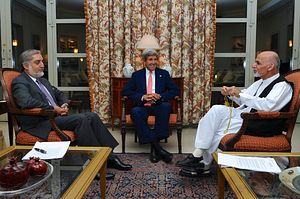Almost two years after the establishment of the National Unity Government (NUG), Afghanistan is still a political mess and not expected to get any better in the foreseen future. The ongoing political quagmire among NUG leadership continues to undermine security, stability, development efforts, and above all, has dramatically increased ethnic rifts.
Chief Executive Officer Abdulllah Abdullah’s blunt criticism of President Ashraf Ghani as unfit to lead the country is just the tip of the iceberg when it comes to their differences. On top of that, Ghani’s first vice president, Abdul Rashid Dostom, seems equally at odds with him. Dostom returned to Kabul after several months and accused Ghani of holding absolute control of all government affairs. He apologized to his supporters and threatened to leave the NUG if his supporters asked it of him. Clearly, tying two political opponents with literally no commonalities in thought and personality – in fact, with irreconcilable political differences — to lead the NUG was rather an adolescent decision. The formula could technically work, but the players were chosen out of desperation after the electoral stalemate.
According to many experts, Ghani’s political unilateralism in a nominally unity government is major issue. He alienated a majority of political players and surrounded himself with a handful of petty politicians as his support base. As a leader, he should instead have come up with an inclusive approach embracing politicians with different views in order to establish a strong political support mechanism for his government. That mechanism would give him enough leverage to implement his reform agenda without being challenged every now and then.
Gathering politically relevant individuals under the umbrella of a national political advisory council would have boosted his political base and leadership virtues,potentially becoming a driving force behind his reform agenda. It may have come with a relatively small price, but it’s believed that the benefits would have substantially outweighed any compromise he would make in return. For Ghani, whose presidency is contested due to electoral fraud allegations, who shares power with an irreconcilable partner and doesn’t enjoy popular support, some kind of a national political advisory council would have been a of vital importance – and it may still be.
The NUG was formed by a bilateral agreement between Ghani Abdullah brokered by the United States. Among others, electoral reform, parliamentary and district council elections, and convening the Constitutional Loya Jirga to create the prime minister position were to happen during the first two years of NUG; that period is just about to expire. The former two are prerequisites for the latter as per the constitution.
Both leaders failed to deliver on their promises, partly because of the incessant disagreements and distrust among NUG leadership, and also due to the structure of the NUG, which has no constitutional definition yet. The lack of action on reforms increased distrust between Ghani and his chief executive, diminished public faith and confidence in NUG leadership, and raised serious suspicions about the will, competence, and sincerity of NUG in improving the status quo.
“From the very first days, NUG become a political platform for competition between two adversaries – President Ghani and Abdullah Abdullah, each attempting to hold more power and influence against the other,” said a senior government official on condition of anonymity. He added, “It wasn’t just Ghani and Abdullah, but some lower rank officials were sparing no effort to add fuel to the rivalry, and their efforts paid off.” Both leaders challenged each other’s decisions on many occasions, showcasing their differences with utmost political immaturity. Their rivalry continues to grow, with no breakthrough on the horizon to reverse the course of the diminishing faith and confidence the Afghan people have toward the NUG.
Today, people are less concerned about the remaining term of the NUG. The alternative to the NUG is chaos, which will serve no political group or individual’s interests. However, Afghanistan’s dwindling economy and security are believed to be a direct consequence of the incessant political quagmire of the NUG leadership. In that, particularly, the political situation is no longer affordable and sustainable, neither for Afghans nor for the international community.
Hamid M. Saboory is a political analyst and a former employee of the Afghan National Security Council. He is the founding member of the Afghanistan Analysis and Awareness (A3), a Kabul-based think tank.

































